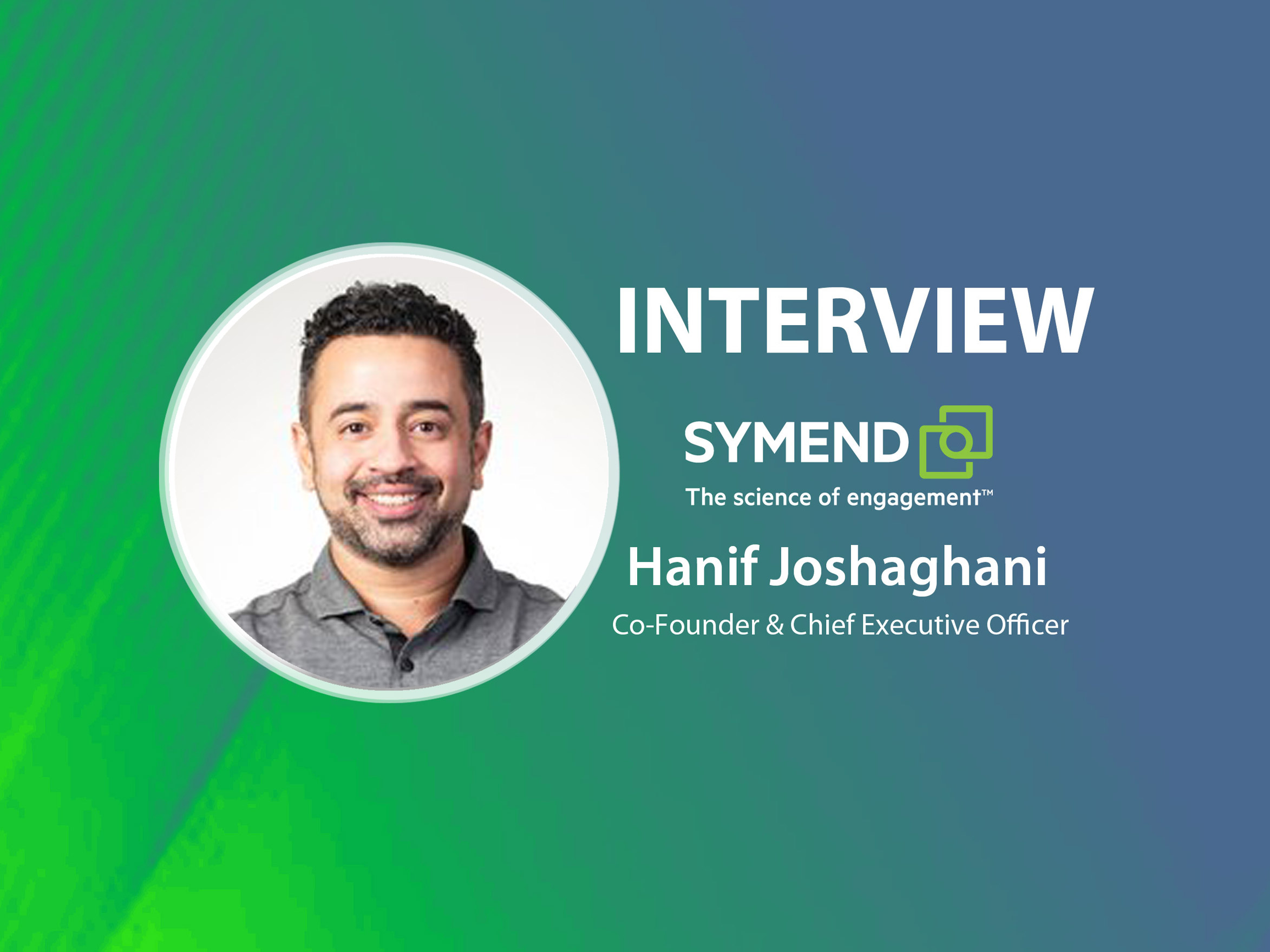Hanif Joshaghani, Co-Founder & Chief Executive Officer at Symend joins us in this interview to discuss his thoughts on why debt recovery management needs a complete transformation while also dipping into his life’s journey and how he feels the ongoing Covid-19 pandemic will reshape business needs going forward. Catch the complete story:
______
Tell us a little about yourself Hanif…what inspired the idea behind Symend? What are some of your biggest plans for the platform in 2020?
My family fled Iran when I was young and lived in refugee camps for more than 10 years before settling in Toronto. I arrived in Canada not speaking any English, and I had never been to school. I had a knack for mathematics, and I went to university 100% funded through scholarships. When I was growing up, my family had very negative experiences with debt collectors. I wanted to develop a solution to improve on the dismal experience of dealing with debt collectors, which is how I came up with the idea for Symend. I want to give back as much as I can, and I understand how difficult it can be when you are behind on bill payments and don’t see a way to get ahead. I want to make Symend a foundation of the North America tech scene. Being able to come to Canada, receive an education, and develop one of the fastest growing technology companies that is focused on helping people is what Canada is all about.
Regarding our biggest 2020 plans, we’re looking to expand into new verticals and geographies, grow the team across Canadian and US operations, and treat 100 million at-risk customers by the end of the year. Our focus is on being the leader in North America and expanding by the end of the year into Europe and Asia. With regard to our engagement platform, we will be investing heavily into expanding its intelligence capabilities. We are also going to see strong growth in our behavioral science team, which will allow us to add even more value to our clients and the customers they serve.
Read More: A Few Interesting Reads on Finance and FinTech
Tell us a little about the latest innovations/developments at Symend, how does the platform work to redefine debt recovery?
Symend’s digital engagement platform combines behavioral science, AI and machine learning to deliver deep insights into customers’ situations and behaviors, providing evidence-based recommended actions. Applying dynamic customer sub-segmentation across products, advanced behavioral modelling, and iterative optimization, Symend helps to create unique treatment strategies that don’t “talk at” customers but instead positively engage them. Symend replaces legacy collection techniques to realign the objective from short-term recovery to long-term relationships.
Given the ongoing pandemic, what top words of advice / suggestions do you have for debt recovery management on the whole?
My recommendation for debt recovery management on the whole is to stop treating it like debt recovery. Due to COVID-19, there is a material sub-segment of mainstream consumers who are struggling. Organizations need to look at what their customers need, understand how to nurture them, and hold their hands toward the future. The companies that approach their at-risk customers only through the lens of recovery are looking at the wrong metrics and will experience more churn than necessary.
Read More: 3 Quick Sales and Marketing Tips for FinTechs and FinTech Startups
Given the ongoing pandemic and its effects, how according to you will the need and demand for contactless payments / other payment solutions now become a priority for both business and individual users?
The need for contactless and other payment solutions is more important than ever. From a business continuity perspective, the ability for companies to learn and iterate is key. Black swan events are happening more often. That means companies need to have the ability to respond to changes in the environment, their operations and consumer behavior quickly. As an example, what operational and organizational plans are in place if a call center goes down? The bigger your organization, the more agile you need to be. You need to make smart, iterative decisions based on data, quickly.
Going forward, showing payment flexibility is key. Companies need to make the experience of paying bills as seamless as possible, and the need for one-click payments has now become critical. Consumers aren’t going to want to interact with a person to make a payment or payment arrangements. This was true before the pandemic and even more so now.
Read More: The Changing Role and Responsibilities of the CFO, during a Time of Crisis
How will the effects of the pandemic impact new innovations in the fintech segment on the whole? What top features/platforms will fintech entrepreneurs have to innovate on to provide the user base?
eCommerce will be a bigger part of every company’s business model. Business has relied on growth innovation and a good economy for 15 years. What we are going to start to see in a downturn is an increase in business process automation, and it will become a priority. The ability to respond to events and be more agile and efficient, while providing an exceptional customer experience through the entire customer lifecycle, is more important than ever. We are already starting to see more focus on business process automation and innovation that creates efficiency in the mainstream vs. growth-centric business models.
Businesses will need to better understand what to do with their customers. Companies should look at how to build better systems to understand trends in customer behavior, and leading indicators will become more important, along with leveraging behavioral science and customer engagement. Organizations that focus on live and dynamic customer segmentation will be able to better understand risk scores to become more dynamic and to adapt and shift quickly. Current risk models are not good enough. Having risk platforms that are dynamic at their core is more and more important, as is doing it cost effectively and transparently. It will be interesting to see if the world moves toward a public repository of customer data stored on blockchain so changes in a large set of personal and macro variables can be ingested and better consumer scoring can be achieved that is live, dynamic and seamless. I am not sure if this will happen, but I think a big leap forward in how consumers are adjudicated – and their ownership of their data – would be a massive benefit to consumers and to society.
What are some of your thoughts on the impact of emerging technologies on the growth and development of future fintech platforms?
Given the way the COVID-19 crisis hit, eCommerce will be more important than ever. The availability of venture capital dollars to fund a broad spectrum of growth-focused ideas will wane in favor of investment in mission-critical systems and business process automation. Security, eCommerce, cloud, payment innovation, and seamless payments will flourish. The risky bet I have is that less stable economies with a high degree of inflation could start using crypto currencies at an increasing rate for day-to-day utility user cases as governments stabilize. Crypto currency found a foothold when the economy was good, and this might be a window where it will take more of a Main Street role. With the huge emphasis on eCommerce and digital storefronts taking off as businesses looked for new ways of operating due to COVID-19, it’s a good opportunity for crypto currency to become a mainstream enablement tool for eCommerce.
Read More: GlobalFintechSeries Interview with John Hensel, Co-founder and COO at Securrency
Tag (mention/write about) the one person in the fintech industry whose answers to these questions you would love to read!
I would love to hear the thoughts of Richard Fairbank, Founder, Chairman and CEO of Capital One, on these topics.
Your favorite FinanceTech quote
“Ignoring technological change in a financial system based upon technology is like a mouse starving to death because someone moved their cheese.” – Chris Skinner
Would you like to share specific finance or business tips for Marketing and Sales teams struggling through this uncertain time?
People are still consuming, but the behaviors and trends have changed. How people are interacting and prioritizing is shifting. Before COVID, we had a growth machine that was driven by globalization and tech-led productivity improvements. What is happening now is being compared to the Great Depression, but it’s not because the foundations of the economy were generally strong. If there is one thing this pandemic has exposed, it is the difference a good social net can make in helping a country bear the brunt of a system shock like this. Countries with a good social safety net are faring far better than those that rely primarily on employers to do the right thing by their employees.
My advice is to stick by your customers, talk to them about what they are dealing with, show empathy, and understand trends in their behavior and play the long game. We are going to go back to the productivity economy, and you need to continue to engage and deliver value now to your customers with an optimistic mindset – better days will come. Brand loyalty is developed in exactly this environment.

Symend is scientifically transforming the debt recovery industry by treating individuals with empathy and dignity at the time they need it most. Founded in 2016 and headquartered in Calgary, with offices in Toronto and Denver, Symend is privately held.
Hanif is a serial entrepreneur who is currently focused on growing Symend, an endeavor he believes in passionately since it represents an intersection between disruption, value creation and social good. Hanif’s background includes 15 years of senior roles in capital markets, energy finance, business development and entrepreneurship in a broad range of industries, including investment banking, energy and technology.
